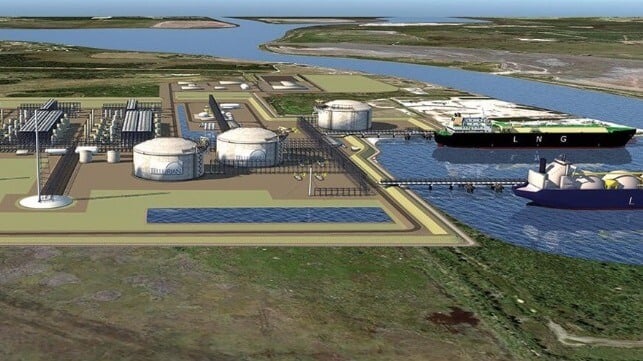Tellurian Starts Construction on Driftwood LNG Export Terminal

American LNG company Tellurian has green-lighted the start of construction for its Driftwood LNG terminal in Louisiana, pointing to the rising demand for American LNG exports to support energy security objectives overseas.
Driftwood LNG will be a liquefaction terminal with a nameplate capacity of about 28 million tonnes per annum (mtpa). The first phase will include two LNG plants with a combined export capacity of up to 11 mtpa, to be followed with an expansion project. Driftwood has received all the major permits required for construction and operation and the detailed engineering work is about 30 percent complete, the company said. Tellurian has finished purchasing and leasing a block of about 1,200 acres of waterfront real estate for its construction.
With the notice to proceed announced Monday, prime contractor Bechtel will move ahead with site preparation and construction of foundations, and Baker Hughes will move forward with building two of the natural gas turbines required for phase one.
“Energy security is a leading concern in many countries today and the United States must do our part to supply LNG to the global market as quickly as possible. Beginning construction now allows Tellurian to deliver upon our robust schedule for first LNG in 2026 while we complete the project financing," said Tellurian President and CEO Octávio Simões in a statement.
The invasion of Ukraine has shown Northern Europe's biggest economies that Moscow's energy comes with a geopolitical price, even if the up-front cost is low. Last week, the White House announced plans to export 50 billion cubic meters of gas (36 mtpa of LNG) per year to the European Union - more than double the total in 2021 - in order to help EU nations wean themselves off of Russian gas exports. If achievable, and if EU nations can secure enough receiving terminal capacity to handle the influx of gas, this LNG sealift would replace about one third of the gas that Europe imports from Russia today. The rest would have to come from energy-efficiency improvements, new renewable-power investments and gas imports from overseas.
"Eliminating Russian gas will have costs for Europe. But it’s not only the right thing to do from a moral standpoint, it’s going to put us on a much stronger strategic footing," President Joe Biden said in a speech Friday.
